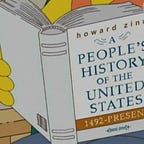The Adventures of Tintin by Hergé
These iconic comics tell the tales of a Belgian reporter and his dog Snowy as they investigate scandals and schemes across the world. Narcotics smuggling, kidnap and gunfights might seem like a lot for a 15 year old boy to handle, but this is no ordinary boy… it’s a fictional character! These books are a window into another world where anything is possible and if you are anything like me you will develop a sense of nostalgia for a cartoon world in a time you weren’t part of, there is a sense of fantastical peril and adventure threaded through every story. Wars, revolutions and pioneering technology are explored through rich visuals and dialogue between preposterous characters like Captain Haddock and Professor Calculus and these exchanges are often amusing or at the very least intriguing. Some people dream of having a GOLDEN ship, others would rather have a SPACE ship, but for me the most valuable of all is a FRIEND SHIP (please excuse me). The iconic relationship between Tintin, his dog Snowy and the other main characters is a key part of why this series is still talked about today when it was originally published in 1929!
There are some dodgy colonial overtones which is not surprising considering the time they were written, to me this doesn’t excuse any insensitivities, but it does make the fact they exist understandable. I think this should be taken into account as you read from a critical perspective as opposed to dismissing the body of work in its entirety. It is written from a bourgeois Eurocentric perspective, which Hergé himself admitted when discussing his prejudices which do result in ignorant and offensive caricatures of people from various countries. Yesterday (depending on when you read this and when I wrote it) I was sat reading at the Barbican in Plymouth and some old geezer was going on about Indian people were not very bright and how superior Britain is in comparison. This made my blood boil and I pitied his ignorance at the same time. I wanted to throw him into the sea or tell him that what he was saying is a load of baloney and that any advantages Britain has over India are due to the sickening scourge that is colonialism. But he shambled off on his bike and instead I had a think about how this jerkoff reached his conclusions, a much better use of my time and one that reminded me of the Tintin racism. It exists, do all you can to be informed and understand it, call it out where you can, but there’s nothing we can do about the past but let it illuminate the present day rather than avoiding it. When I question anything in a book or another form of media I like to investigate it and that helps me to be more informed in the future. Sorry, it’s a complicated answer to a question that wasn’t even asked but these books made me think and this is the thought related to this one!
Hergé’s work is known the world over and like any subject there are fanatics that know the stuff inside out! Tintinology is a big deal and studies the value of the writing in a vivid universe with surprisingly gritty themes and a murky sense of justice impacting on all of the characters. The mechanics are slick and only noticeable when you stop to analyse them. Mainly I just enjoy the dynamic stories but when I stopped to look more closely it dawned on me how good these comics are! I didn’t think I’d get so much from looking at comic books I’d first explored in my childhood, but it seems much more sophisticated now that I’m an old chunk of coal that can understand a bit more about what’s going on. I am more Team Asterix (which I still adore), but Tintin’s nuances have certainly grown on me!
